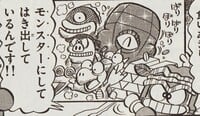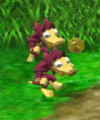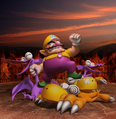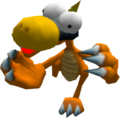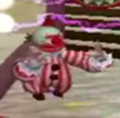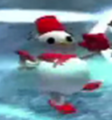Magon: Difference between revisions
(added an image) |
No edit summary |
||
| Line 12: | Line 12: | ||
According to Wario's description of Magons in the ''Wario World'' instruction manual, they do not think about "anything whatsoever."<ref name=Magon/> | According to Wario's description of Magons in the ''Wario World'' instruction manual, they do not think about "anything whatsoever."<ref name=Magon/> | ||
[[File:MagonODWD13.jpeg|thumb|left]] | |||
In the ''[[Ore Dayo! Wario Dayo!!]]'', Magons | In the ''[[Ore Dayo! Wario Dayo!!]]'' manga, Magons appear in volumes 1 and 2, where they act as minor enemies Wario defeats. | ||
{{br|left}} | {{br|left}} | ||
==Traits== | ==Traits== | ||
Revision as of 19:27, October 25, 2023
| Magon | |||
|---|---|---|---|
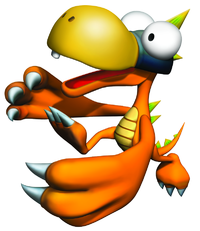 Artwork of a large Magon | |||
| First appearance | Wario World (2003) | ||
| |||
Magons[1][2] are a species of enemies in Wario World, first encountered in Greenhorn Forest. They come in small and large variants; the small Magons can be defeated in one punch, while the large Magons require two punches to defeat. Magons are bipedal yellow (for the small type) or orange (for the large type) lizards with a spike on their head. All large Magons attack Wario with either a claw swipe or a sliding attack; the latter does no damage, but can cause Wario to drop any enemy or item that he is carrying. Small Magons do not attack in Greenhorn Forest, merely approaching and standing near Wario in large groups, but starting in Horror Manor they can attack Wario with a fast bite attack.
Aside from the basic Magons in Excitement Central, other varieties include Zombie Magons in Horror Manor, Clowns in Wonky Circus, Snowmen in Shivering Mountains, Wolves in Beanstalk Way, Miitī in the Mirror Mansion, and Mummies in Pecan Sands. Each Magon derivative gradually attacks at a faster rate than the previous variant.
According to Wario's description of Magons in the Wario World instruction manual, they do not think about "anything whatsoever."[1]
In the Ore Dayo! Wario Dayo!! manga, Magons appear in volumes 1 and 2, where they act as minor enemies Wario defeats.
Traits
Magons develop several traits as the game progresses. Big variants follow Wario, try to hit him with their claws, and will roar while idle. If there are enemies in the way and they cannot reach Wario, they will taunt Wario with one of their two taunts. The small variant follows Wario and will roar and hop in place while idle. They are unable to attack at the start, but starting with Horror Manor, small Magons gain a bite attack and keep it for the rest of the game. They get scared and tremble in fear after Wario beats other nearby enemies. If they are alone, they will scream and try to run away. If they are beaten while running away, they will drop six big coins, which are each worth ten regular coins. Some Magons will block Wario's path, the ones that do will not move and will just taunt Wario.
The sizes come in two additional behaviors; clumsy and fast. The clumsy ones sometimes trip on the floor while walking. If a small variant is clumsy and Wario walks behind them, they will look around and then sprint towards Wario with their arms raised. The fast kind is able to walk faster than normal. If a big variant is fast, it can slide onto the floor, pushing Wario out of the way.
Gallery
Small
Big
Wario after defeating two Magons and a Cractyl
Names in other languages
Small
| Language | Name | Meaning | Notes |
|---|---|---|---|
| Japanese | タマゴン[3] Tamagon |
Portmanteau of「卵」(tamago, egg) and "dragon" |
Big
| Language | Name | Meaning | Notes |
|---|---|---|---|
| Japanese | ビッグタマゴン[3] Biggu Tamagon |
Big Magon |

